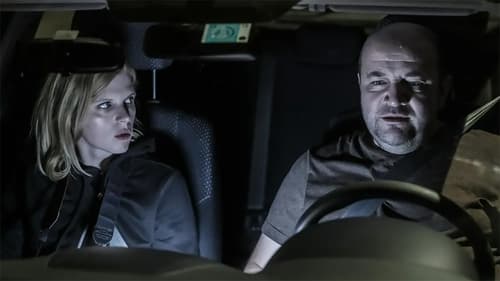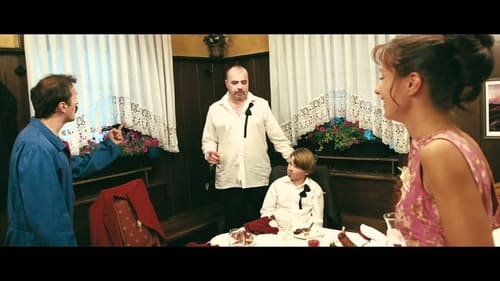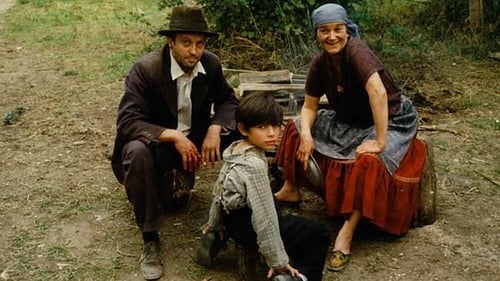
Vlado
Two elderly musicians in search of a sweetheart from their younger days cross paths with an up-and-coming young singer. Together, they embark on a once-in-a-lifetime adventure.

Sandi
Leo is an Italian who lives in Slovenia. Vučko is a Bosnian who arrived to Slovenia as a child refugee. Leo continues to stay in Slovenia because of his ex-wife Tanja and his son Luka, hoping that they can become a family again. When the bank refuses to grant a loan Leo and Vučko would need to renovate their restaurant, they have no choice but to accept an offer from Gianni, a swindler. They are tasked with stealing Gianni’s truck so that he can collect the insurance money. However, instead of stealing Gianni’s truck, Leo and Vučko mistakenly steal a truck full of refugees. Vučko the refugee and Leo the migrant themselves thus inadvertently become responsible for destinies of people similarly unfortunate as they had once been. In order to solve their financial problems, they decide to sell the refugees. At first it seems that they are not indifferent towards these people, but with each passing day there is less and less humanity left in Leo and Vučko.

Franta
A political drama with elements of a thriller discusses politics, electoral fraud, and the decay of moral values, taking place in the fictional town of Rovte under the idyllic Alps. Franta, a corrupt mayor, is about to lose the election. After a TV debate, where he fails utterly, Franta calls his mistress Jozica in desperation. She advises him to seek the aid of Fleischmann, a criminal who is the only one capable of solving the problem on such short notice. After all, there are only four days left until the elections.

Mirko Breznik
Slovenia, Australia and Tomorrow the World is a drama film with elements of comedy. The central character Boris works as a machinery maintenance man in a factory, hoping that his work and efforts will be awarded in the future. And indeed, he is given an opportunity by Cosmica, a company providing door-to-door sales and counselling services as well as investment in securities.

Fras
Lovro, a rocker from Pohorje, Džon to his friends, a bachelor in his late thirties, has become victim to modern business machinations: after he failed to get his papers in order in time, the land that had been his family’s property for generations came in the possession of the greedy mayor Fras. However, being short-tempered and as a hunter also a skilled shooter, Džon takes justice into his own hands. Assisted by young journalist Alja he exposes Fras and his helpers.

Ravnatelj
The focus is on the disintegration of an idyllic relationship between parents, Marko and Dunja. This is due to a lack of respect, caused by loss of employment and a financial breakdown. In time, the parents are no longer able to bear their burden, which is thus increasingly weighing their children down. In Slovenia, the story from The Basics of Killing occurs on a daily basis, but it could happen anywhere. To those familiar with the phenomenon, the film will be a painful experience, to others, may it be a warning.

Documentary drama Partisan Priest is based on the dramatic life story of Slovenian priest and partisan Jože Lampret. All his life, this uncompromising fighter for justice and equality strived to reconcile the irreconcilable: Christian practice and international socialism. In the end, he was betrayed by both – not the ideas, but by those who saw him as the enemy or merely the means to get what they wanted. A story which indirectly reflects the present day.

Foter
The newest tycoon Robert wants to gets his hands on the land where the driving school stands and build a modern shopping center in it's place instead. It is during this acquisition that lands him in an altercation with Instructor Jože, whose wife left him and Roberts daughter Lija. Lija is determined to go to driving school in spite of his father's prohibition. Besides the tense that portray the ruthlessness of our world, the story offers a range of warm and interesting human relationships seen as part of our everyday lives.

Jože Sfiligoj
The main protagonists of the film are members of the gypsy family Mirga. Lutvija Belmondo Mirga narrates a story about four generations. Belmondo is the central character of the film, a gypsy king, who decided to establish his own gypsy village. He names it Shanghai. Belmondo makes a living smuggling and his power and influence grow big. He even gets the local police and politics on his side and that helps him to become untouchable for law. But with the downfall of Yugoslavia, smuggling of goods is replaced by smuggling of the arms. Though lucrative the business starts to threaten Belmondo’s personal life and he finds himself at the crossroads. Will he protect his own family or is he going to sacrifice his personal happiness for business ambitions?

Direktor Podbregar
Set in socialist Yugoslavia in 1986, a humble and diligent factory worker falls into a 10-year shock right at his working place. He wakes up from coma in hospital in 1996 capitalist Slovenia, only to find out that he's left without job as being redundant.

Maks Bigec
Worker Maks Bigec decides to take things in his own hands when he hears that his factory will be closed. He takes the factory director as a hostage and demands that the state should reopen the factory.

Tina's father
A story about the price of success. It reveals the cruelty of the music scene that a young and talented girl has to cope with in order to succeed.

Edward Kartnerwald
An old legend of a vampire from Gorjanci forest, a dwelling place for creatures from folk legends and myths.

Gajaš
After being fired, a young car mechanic Đuro gets recommendation to look for another job in a remote village. His new boss is warm, old fashioned and naive - completely opposite from the world he's coming from. The peaceful atmosphere is shaken when Đuro falls for a regular customer's wife.

Radio moderator
Tadej and Lana, a young couple, are struggling through the world of drugs, dealers, addicts and prostitution. He is addicted to heroin and she is trying to help her boyfriend. When she realizes that all her efforts are in vain she becomes so desperate that she decides to take heroin herself in order to show Tadej how weak he is. Unfortunately the drug is stronger then her too and a year later she finds herself in the same situation. Now they are both in continuous search for daily fix.

Renatin oče / Renata's father
Pero is a professional funeral speaker in a small Slovenian town. His unique gift is to make every funeral that extra bit special. Pero just can't help turning his eulogies into witty personal confessions that bring the grieving crowd to tears for all the wrong reasons.

Špela's father
A story about a couple from the bottom of the social ladder, about smuggling refugees across borders and other 'suspect' things- it is, first and foremost, an attempt to tell a story about the worst in people, wherever they may be coming from.

Paznik Albert
In Yugoslavia's Livada prison in 1970, inmates led by Keber convince reluctant authorities to let them watch the televised Olympic final basketball game between the home country and the U.S., but taunting guards interrupt the viewing and prod the prisoners to the point of a riot. After a period of a kind of blissful anarchy where the inmates taste freedom, Keber enlists the house "intellectual" Mrak to devise a system of prisoner self-government aimed at forcing reforms on the state.

Pacnjek
A look at the life and thoughts of France Presern, arguably the most prominent Slovenian poet, as well as historical background of his time. How our tragic hero became a symbol of Slovenian culture.

Balerina
Kovač and Dara, whose childhoods start badly, meet in an orphanage and get attached to each other. After ten years, when they are in their teens, and both share an immature view of the world, they accidentally meet again. Kovač is a gang leader, Dara lives a lonely life in her own enchanted world. Kovač's gang starts getting involved in more and more serious deals. When the rascals find themselves caught between loyalty to different mob bosses and running from corrupted policeman, their juvenile illusions disappear. The way back is hardly possible. Will the rascals manage to run beyond, will Kovac and Dara be able to save their wasted youths and begin new lives?

Tailor
Poker is not just a game, it's a Philosophy! What happens when Borut, a modern-day anti-hero with no respect for rules, gets mixed up in it? Duro was sent to find out where his boss's missing money has got to, Matjaz is in the game so as to be near his love, Aljosa is trying to find himself in poker. Vesna, the dealer, tries to satisfy everyone, herself included, in this dangerous game... Consequently Borut gets tangled up in a cruel game for life, in a crime drama full of twist and bloody score-settling, in which it would be difficult to find a winner. Poker tells the truth about life, not just about death written in the cards.

Catholic priest Jon Urski has broken the rules. As a result he has to go to Mokus, an abandoned parish in the middle of a marsh which has been without a spiritual leader since the mysterious death of the previous parish priest Janos Talaber. Jon Urski is resolved to rebuild, with the help of the villagers, the ruined church at Mokus. But the people are afraid that restoring the church will arouse pagan demons. The wild waters are beginning to rise... Water is pouring into the restored church from all sides and begins to erase the border between reality and the dreams.

Private detective Emil Marlovsek can boast a wealth of solved cases of run away and lost dogs. He is assisted in his work by his secretary Beba and Milivoj, a retired officer of the Yugoslav National Army. One evening, Emil encounters the beautiful Sara in the bar where he occasionally plays the piano and falls in love at first sight. The next morning Sara disappears. Not long after he is paid a visit by entrepreneur Grubelic whose wife is missing. Emil soon realizes that she is Sara and immediately starts to search for her. He discovers that Sara is being held prisoner by the mafia, on account of her husband's fishy business involving people in high places. The story's outcome is completely unexpected.

Boss

Landlord
A tragedy looms for a young Gypsy violinist whose half brother is in the throes of first love.

Konrad Zdravič
Felix Langus is increasingly obsessed with the idea of communicating with supernatural forces, which warn him of the great peril of danger. Attacks of obsession are triggered by aggressive media, which are constantly challenged by dangerous information in a graduated rhythm. At his job as a driver, he has more and more problems. He's moved to an undemanding workplace, but his obsession proves to be dangerous even there, which leads him to unpredictable and grotesquely funny complications. Together with his psychotherapist, he can not escape a common fate...

In the revolutionary year of 1968, Stane is an active rebel student. Mojca is a freshman, has a boyfriend named Vid, whom she met at the carnival party. There she also met her later husband Stane. Vid leaves for military service, while Stane successfully avoids it. During the glorification of this event, Mojca and Stane come together intimately. Upon his return from the army, Vid discovers this love triangle. Stane and Mojca get married. The death of the child and the awareness that Stane is cheating on her, leads Mojca to divorce.

Karol Gatnik
Los Angeles in 1935. Fritz Lang receives in his hotel apartment the young film amateur Willy, who wants to prepare an interview with him. At a certain moment Lang starts relating how, as an army officer in the First World War, he spent some time in the house of the lawyer Karol Gatnik in a small town in the northeast of Slovenia. Lang makes friends with Gatnik and gets aquainted with all members of his family. When Lang finds out that Gatnik is a passionate film amateur and that he also possesses his own camera, they make a film together. This is probably Lang’s first contact with cinematography. Late at night Lang looks at the photographs in Los Angeles and revives in his spirit the imaginary meeting with his friend Gatnik.

By a twist of fate, Damjan is mistaken for a murderer who was prowling the streets of Ljubljana in the same neighbourhood. Because of his naive, friendly approach and helpfulness, his wife walks out on him and the police have doubts about his sanity. Is Damjan really losing his memory like his father did before him? And does purity of mind and spirit necessarily lead to a person's downfall? Will Damjan, who is mysteriously attracted and connected to the cinema and who finds himself drawn into a case of mistaken identity (just like in the movies) succeed in setting his life in order in spite of the mix-up and in finding the right companion for himself?

Rudi
The city of Maribor before the Second World War, and Maribor after its liberation mark the period in which the film Cafe Astoria is set. The story relates with a gentle melancholy and a slight irony the lives of a middle-class family: the cafe owner, his wife and their son. Through their individual destinies we become acquainted with the social and historical background of a by-gone era; the social and national differences of pre-war Maribor, divisions among the wealthy and poor, and nationally minded Slovenes and fanatic Germanophils. The first year after the war introduced the absurd characteristic cruel measures of the so-called revolutionary social transformations in which calamity and coincidence intervene, resulting in events of comic nature, of course, as seen from a safe distance of fifty years.

The reconstruction of creation of an influential avantguarde movement called "Novo Mesto Spring" that arrived on Slovenian cultural scene during 1920s. Within this movement worked significant local artists such as composer Mario Kogoj, painter Rihard Jakopic, poet Danijel Bohoric and many others.

Two girls who study theatre & drama and their friend photographer decide to rob a bank, using all sorts of their creative force and imagination to implement the idea.

Year 1945. The second World War is over and the soldiers from the disbanded army are returning home. Yet there is still no sign of Joze Malek.

Napovedovalec
In the wild times of the Second World War, Blanka marries political grandee Pavle, who is shortly afterwards sent to Goli Otok as a political prisoner. Blanka has enthusiasm for photography, becomes independent and opens a studio of photography with Laco. But soon she realizes that her business partner is an impostor. Pavle returns from prison, but their relationship, despite awareness of the political interference in their intimate sphere, imbues the bitter chill and misunderstanding. Blanka tries to drown her endless problems in alcohol and seduce her only male friend, but her last rescue, the thread of love, is being interrupted as well. Is every love of Blanka Kolak sentenced to death, is love possible at all, is worth living without it?
































